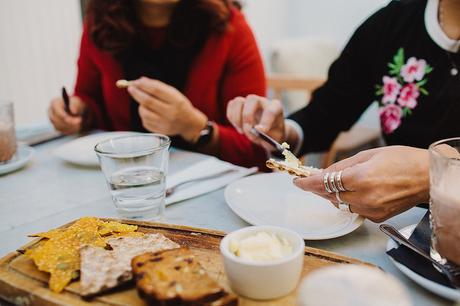
What you eat is important, but even healthy food can stop you from losing weight if you eat too much of it. I have plenty of personal experience in that area. Coming back from a two week road trip where I tried my best to eat clean but the quantity sometimes got out of hand. While I am extremely proud of myself for maintaining my sugar-free lifestyle even while traveling, I could definitely have done better at portion control. Oh well. Next time. Some of the lessons I am learning on this eat-as-clean-as-possible journey is that there is a lot of contradictory information out there and one has to figure out what is the best either via expert of trial and error.
One thing I can vouch for is that extreme calorie restriction is never a good idea, as most people aren’t very good at it anyway, but there are some tricks you can use to slightly reduce the amount of food you eat without feeling deprived, or even really noticing.
[ Related : 9 Food To Increase Focus & Productivity ]
Your brain is easily fooled by shifts in perspective. It’s also more responsive to external cues like an empty plate, than internal cues like a full stomach. Understanding these influences can show you how to tilt them in your favor.
Usually we eat more than we should because of the mindless margin, but you can use the same principles to subtly influence your behavior and mindlessly eat less. Over time this calorie difference can help you drop weight. It’s slow, but it’s steady. And best of all, it’s painless.
1. Use smaller plates
A full plate sends the signal that you’re eating a full meal and a partially full plate looks like a skimpy meal, regardless of the actual quantity of food.2. Serve yourself 20% less
The mindless margin is about 20% of any given meal. In other words, you can eat 80% of the food you’d normally eat and probably not notice, so long as no one points it out to you. You could also eat 20% more—not a bad idea if you’re scooping vegetables. If you have those smaller plates mentioned above, serving yourself a little less should be just as satisfying.3. Use taller glasses
Just like less food looks like more food on a smaller plate, height makes things look larger than width, even when the volumes are the same.4. Eat protein for breakfast
People love to hype breakfast eating as a miracle weight loss cure, but only breakfasts high in protein have been proven to suppress appetite and reduce subsequent eating throughout the day.5. Eat three meals a day
I bet you thought eating many small meals was better than eating three bigger ones throughout the day. I thought the same, but the data tells us otherwise. Though skipping meals can make controlling your appetite more difficult, eating more than three meals a day has not been shown to have any benefit, and may even be worse for appetite control. Eat when you’re supposed to and you shouldn’t need any extra food. I am still working on this myself!6. Keep snacks out of sight or out of the building
People tend to eat a lot more when is food visible rather than put away where it can’t be seen, even if they know it is there. The harder food is to get to, even if the extra effort is just removing a lid or walking to the cabinet, the less likely you are to eat it. The extra work forces you to question the value of your action, and this gives you the opportunity to talk yourself out of a decision you may regret later. To avoid extra snacking keep tempting foods out of sight, or better yet, out of the house. On the flip side, keep healthy foods prominently displayed and easy to reach. This is exactly how I am able to stay sugarfree. I have stopped buying anything with added sugar AT ALL!7. Chew thoroughly
Since I’ve been paying more attention to eating speed, I’ve been horrified to observe that most people don’t chew. If you’re one of those guys who chews the minimum number of times before swallowing or shoveling in another fork full, chances are you’re eating substantially more at every meal than your thoroughly chewing peers. Slow down, chew each bite (counting your chews can help develop the habit) and watch as you fill up faster on fewer calories.8. Don’t eat from the package
Your stomach can’t count. When you can’t see how much you’re eating you’re more than a little likely to lose track and consume double or even triple the amount you’d eat if you took the time to serve yourself a proper portion. Use a plate, or a bowl, or even a napkin, just make sure you get a good visual of everything you’re going to eat before taking your first bite.9. Don’t eat in front of the TV
For the vast majority of us, distracted eating is overeating. The end of a show or movie is another powerful cue signifying that a meal is over, so parking in front of the TV with your plate for a Netflix binge is probably not the best idea. There’s no reason you can’t take twenty minutes to sit down and have a proper meal before enjoying your shows. DVR, anyone?10. Don’t pay attention to health claims
But wait, isn’t healthy food supposed to be better for you? In theory, yes. But truly healthy food—vegetables, fruits and other unprocessed foods—rarely have labels at all. Instead foods with health claims tend to be processed junk repackaged as better for you alternatives.Even worse, research has shown that people drastically underestimate the calories in foods with visible health claims on the packaging. People also tend to eat more food overall as a result of this miscalculation. [ Related: Life Without Sugar - 3 Month Update ] These are all the ways I am trying to improve my eating habits. I am not there 100% yet, but it is work in progress. I will keep you posted on how things turn out. Let me know if you found these tips helpful or have any suggestions to add.

